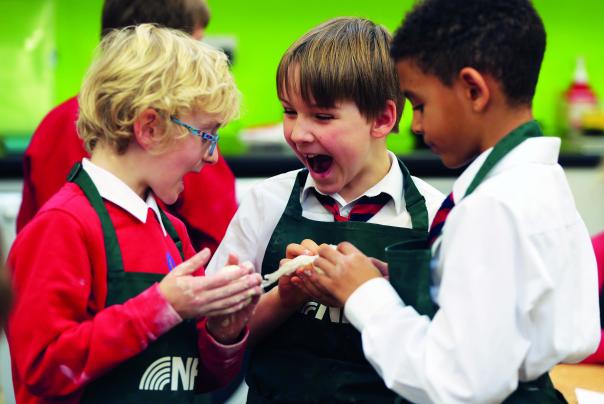
We’ve all met a child (or indeed, an adult) who is an incredibly fussy eater and if you haven’t, then a good place to find one is in a school hall during lunch time. You can usually spot them by their furrowed brow and muttered assertions about ‘these peas’ being the wrong colour or ‘these carrots’ being a different shape to the ones at home and how they can’t possibly be expected to try them.
It is therefore unsurprising that a third of UK children eat less than one portion of fruit and vegetables a day and food waste is a growing problem both in schools and across the UK.
It is estimated that as a nation, we throw away around 9.5m tonnes of food every year- 6.4m tonnes of which is still edible. The impact of this is that the equivalent of 15bn meals are thrown away every year in a country where 8.4m people are experiencing food poverty.
Food waste alone generates 8% to 10% of global greenhouse gas emissions, making it a significant contributor to global warming and the United Nations’ Sustainable Development Goal 12.3 aims to halve this by 2030.
This is an ambitious target considering the most recent data collected by the charity Waste and Resources Action Programme (WRAP) suggests that although UK citizens were able to reduce their food waste during the Covid 19 pandemic, food wasting behaviour returned to pre-pandemic levels within a month of the national lockdown coming to an end.
As a society, we have become disconnected from our food. As long as the supermarket shelves remain stocked and the fridge remains full, we have little cause to wonder where it has come from or to understand the processes, people, time and effort involved in getting it to our plates. Without this understanding, it is all too easy to throw it away and to pass this attitude on to our children.
By 2030, many of the children we meet in schools now will be approaching adulthood and so we have an opportunity to educate these consumers of the future about this growing issue and alter their perceptions of food before they get there. However, the national curriculum places little emphasis on food and none at all on wasting it and teachers just do not have the time to fit extra topics into their already tightly packed timetables.
A solution is needed that connects children with where their food comes from at the same time as delivering national curriculum objectives- in other words, something that bridges the gap between the school kitchen and the classroom. This is the goal of the NFU’s ‘Farming STEMterprise’, an award-winning, free scheme of teaching and learning.
It’s an idea that started in my own classroom but has now grown into a range of cross-curricular STEM projects that are downloaded 50 times every school day and used in schools across the world.
It takes primary school children through each stage of setting up their own farm shop business and developing their own food products by considering seasonality and nutrition, conducting market research, growing ingredients, budgeting, calculating expected profit, designing responsible packaging and more.
Practical Science and Design & Technology lessons, closely tailored to each year group’s national curriculum programme of study, are incorporated throughout the projects alongside opportunities to develop an understanding of financial literacy and food provenance- important concepts to grasp as they grow into young adults.
Farming STEMterprise projects have been written with teachers in mind and so an emphasis is placed on reducing workload and making it as simple as possible to implement them in schools.
The projects allow children to experience the time and effort involved in growing and nurturing their own ingredients and teach them the essential life skills they need to safely and correctly prepare what they grow. By giving children as young as five this opportunity and reinforcing it each year as they move through the school, the projects can contribute to a culture of respect and appreciation for food which in turn may reduce the likelihood of them wasting it.
It is the perfect project to build a relationship between the school kitchen and the classroom and although the main body of the content is written to be delivered by teachers, there are many opportunities for school chefs to get involved. From giving a tour of your kitchen or an interview to aid the children’s market research, to leading a knife skills session or judging their final products, the projects have been designed to be flexible and adaptable to suit all settings.
NFU Education offers free, practical training sessions to bring the projects to life and share ideas on using it in your school. If you would like to learn more, please email education@nfu.org.uk to register your interest in attending a session.
The free Farming STEMterprise projects, which include thorough lesson plans, presentations and teaching resources, can be downloaded from www.nfueducation.com/stemterprise.